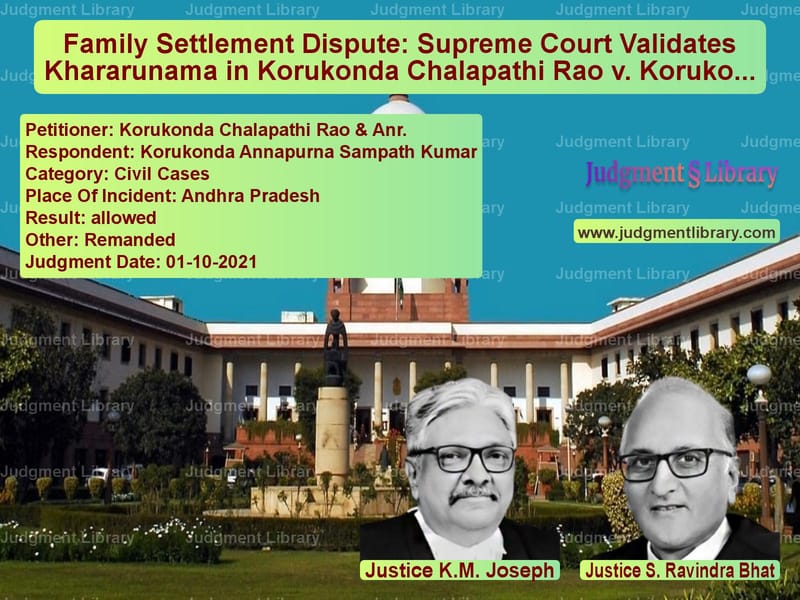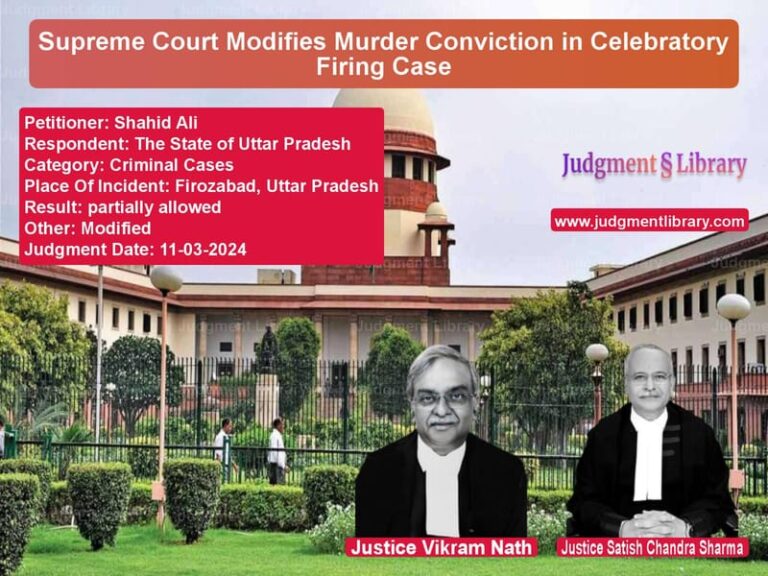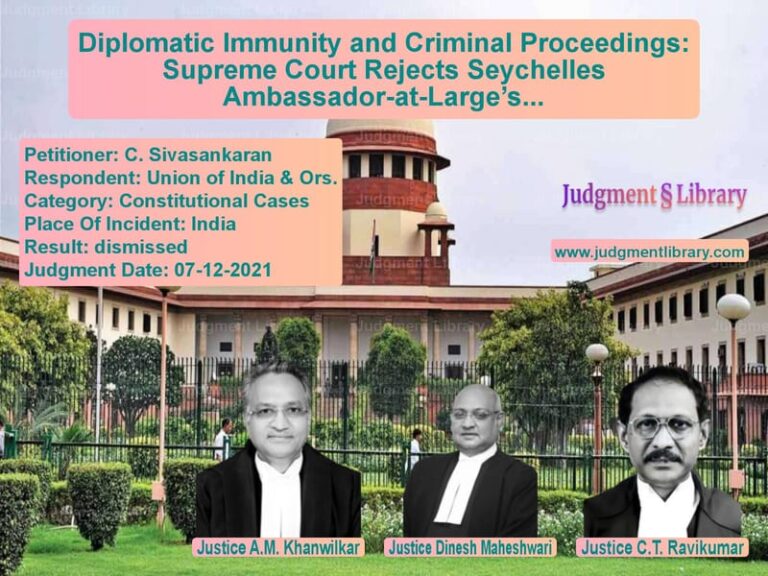Family Settlement Dispute: Supreme Court Validates Khararunama in Korukonda Chalapathi Rao v. Korukonda Annapurna Sampath Kumar
The Supreme Court of India recently delivered a significant ruling in the case of Korukonda Chalapathi Rao & Anr. v. Korukonda Annapurna Sampath Kumar, where the main dispute revolved around the validity of a family settlement document (Khararunama) and an unregistered receipt of Rs. 2,00,000/- as evidence in a partition-related conflict. The Court overturned the High Court’s decision, thereby reinforcing the principle that family settlements should be recognized to ensure family harmony.
Background of the Case
The dispute originated from a family partition arrangement among three brothers, including the appellant Korukonda Chalapathi Rao and the respondent Korukonda Annapurna Sampath Kumar. The respondent had filed a suit seeking a declaration of title and eviction of the appellants from the disputed property. The appellants argued that a family settlement (Khararunama) executed on April 15, 1986, along with a receipt dated December 8, 1993, validated the transfer of property rights. However, the High Court ruled that these documents were inadmissible due to the lack of registration and proper stamping.
Legal Issues Examined
- Whether an unregistered family settlement (Khararunama) is admissible as evidence.
- Whether the receipt of Rs. 2,00,000/- could be used as proof of settlement despite being unregistered.
- Whether the High Court correctly interpreted the requirements of the Registration Act, 1908.
- Whether the family settlement required compulsory registration under Section 17(1)(b) of the Registration Act.
Petitioner’s (Korukonda Chalapathi Rao & Anr.) Arguments
The petitioners contended that:
- The family settlement was an oral agreement and the document merely recorded a past transaction, not requiring registration.
- The respondent had acknowledged the settlement and had even signed the documents.
- Under settled principles of law, a family arrangement does not require compulsory registration if it only records a pre-existing division.
- The High Court had erred in disregarding established precedents that recognize unregistered family settlements as legally binding.
Respondent’s (Korukonda Annapurna Sampath Kumar) Arguments
The respondent countered:
- The settlement Khararunama was a legally binding document that transferred property rights and thus required registration.
- The appellants had forged his signatures on blank papers to create fabricated documents.
- Since the document was not registered, it was legally inadmissible as per the Registration Act, 1908.
- The claim of payment of Rs. 2,00,000/- was not backed by any substantial proof.
Supreme Court’s Observations
Validity of the Family Settlement (Khararunama)
The Supreme Court held that a family settlement need not always be registered if it records an already executed division rather than creating fresh rights. The judgment stated:
“If the terms of a family settlement are reduced into writing merely as a record of an already completed partition, such a document does not require registration under Section 17(1)(b) of the Registration Act.”
Admissibility of the Receipt for Rs. 2,00,000/-
The Court ruled that:
“Even if an unregistered family settlement cannot be used to prove title transfer, it can be relied upon for corroborative purposes to show the conduct of the parties and their understanding.”
Thus, the receipt could be considered as a supporting document to establish the terms of the family settlement.
Application of Precedents
The Court cited past rulings, including:
- Kale v. Deputy Director of Consolidation (1976): Recognizing oral family settlements.
- Subraya M.N. v. Vittala M.N. (2016): Holding that an unregistered document could be used for corroboration.
- Thulasidhara v. Narayanappa (2019): Affirming that an unregistered family settlement is valid as long as it records past agreements.
Final Judgment
The Supreme Court ruled in favor of the appellants:
- The High Court’s decision was set aside.
- The family settlement (Khararunama) was considered admissible for proving the understanding between family members.
- The case was remanded back to the Trial Court for further adjudication based on the admitted evidence.
Implications of the Judgment
- Reinforces Family Settlement Laws: The ruling upholds the validity of oral and unregistered family arrangements.
- Ensures Justice in Family Disputes: Protects rightful claims without excessive procedural formalities.
- Clarifies Registration Requirements: Differentiates between documents that need compulsory registration and those that do not.
Conclusion
The Supreme Court’s ruling in Korukonda Chalapathi Rao v. Korukonda Annapurna Sampath Kumar sets a crucial precedent in family settlement disputes. It clarifies that family arrangements do not require registration if they merely document an oral agreement. By recognizing the validity of such settlements, the Court ensures that family disputes can be resolved amicably without unnecessary legal formalities. This decision will serve as a guiding principle for similar cases in the future.
Petitioner Name: Korukonda Chalapathi Rao & Anr..Respondent Name: Korukonda Annapurna Sampath Kumar.Judgment By: Justice K.M. Joseph, Justice S. Ravindra Bhat.Place Of Incident: Andhra Pradesh.Judgment Date: 01-10-2021.
Don’t miss out on the full details! Download the complete judgment in PDF format below and gain valuable insights instantly!
Download Judgment: korukonda-chalapathi-vs-korukonda-annapurna-supreme-court-of-india-judgment-dated-01-10-2021.pdf
Directly Download Judgment: Directly download this Judgment
See all petitions in Property Disputes
See all petitions in Succession and Wills
See all petitions in Specific Performance
See all petitions in Judgment by K.M. Joseph
See all petitions in Judgment by S Ravindra Bhat
See all petitions in allowed
See all petitions in Remanded
See all petitions in supreme court of India judgments October 2021
See all petitions in 2021 judgments
See all posts in Civil Cases Category
See all allowed petitions in Civil Cases Category
See all Dismissed petitions in Civil Cases Category
See all partially allowed petitions in Civil Cases Category







